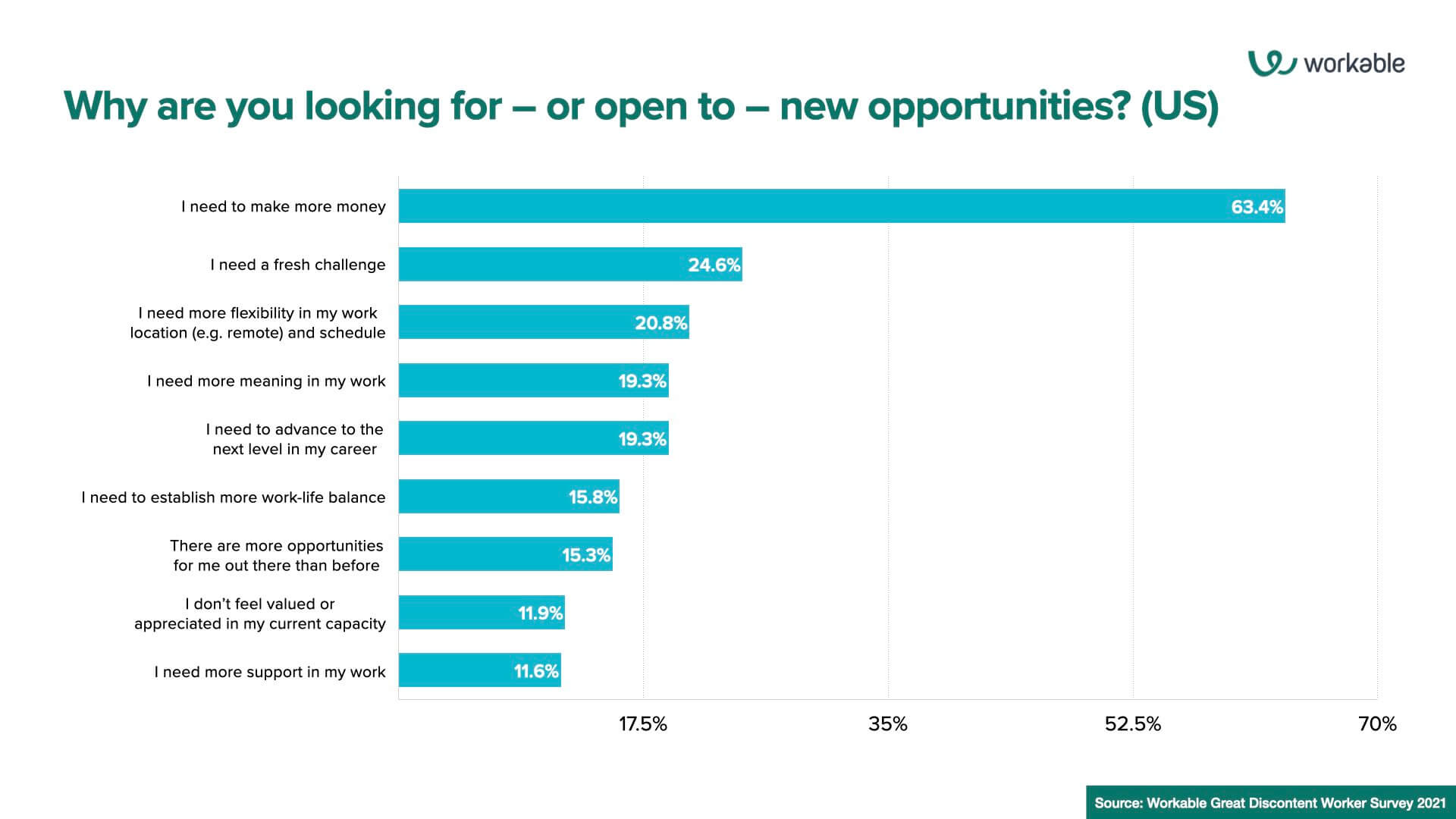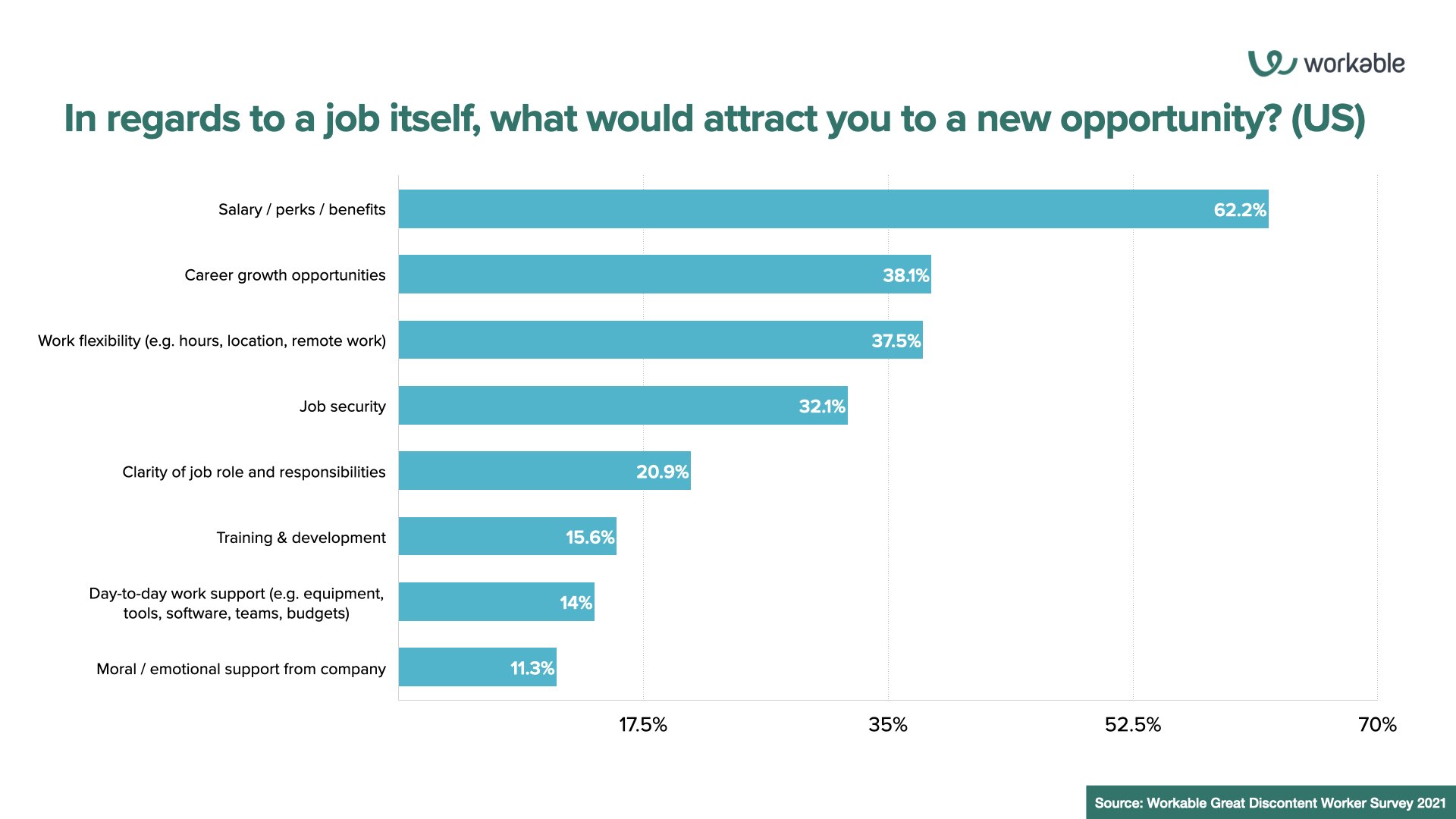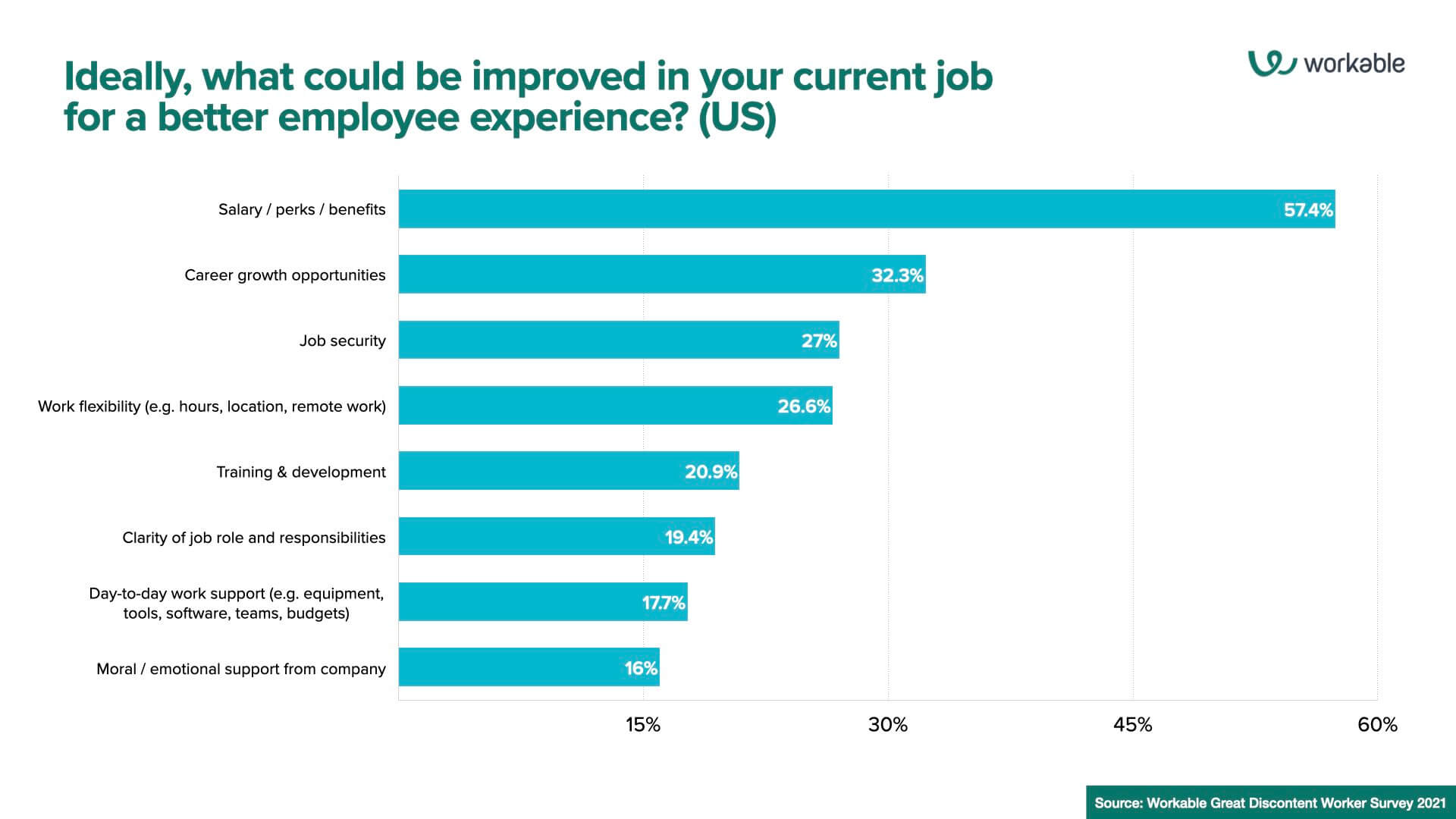Is salary important to workers? Bet your bottom dollar it is
Salary is crucial to workers, with a majority open to new opportunities primarily to earn more. While factors like fresh challenges and work flexibility matter, compensation remains the top attractor and area for improvement in current jobs, underscoring its importance in employee satisfaction.

Compensation sits at the very core of the worker-employer relationship. And the survey results from our Great Discontent study of 750 workers in the United States cements this reality. Salary is important.
The only real ‘surprise’, if there’s one, is that other studies show a growth in value placed on job attractors besides compensation – such as the willingness to take less salary in order to remain remote according to a TeamBlind survey, and the value of perks over salary as a motivator according to Staples.
Our dataset, however, clearly indicates that compensation remains the number-one driver in career opportunities across the board. As one respondent succinctly put it:
“Employees will go where the money is. And where they’re treated respectfully and valued. But, mostly, it’s the money.”
Take a look at the dataset and see for yourself.
Money above all
As stated above, a full seven out of 10 respondents are open to new opportunities, whether they’re passively open or actively looking.
When we asked those respondents to choose from a list of top reasons why they’re open to new opportunities, nearly two-thirds (63.4%) selected “I need to make more money”.
That’s more than double the next-most popular reason, which is “I need a fresh challenge” (24.6%).
Work flexibility (20.8%), meaningfulness in work (19.3%) and career advancement (also 19.3%) are other leading factors prompting the drive to explore new job opportunities. Still, those numbers pale in comparison to compensation.
We also asked respondents what would lure them from their present job to a new one, again choosing from a list of popular attractors. Again, compensation remains the top attractor, with 62.2% of respondents in the US citing that as a top factor in deciding to move to a new company.
Again, other major attractors here are similar to the previous question, with career opportunities (38.1%), work flexibility (37.5%) and job security (32.1%) being reasons why someone would jump to a new job.
Another respondent was frank about their emphasis on salary as the dealmaker:
“If someone pays me more than I make running my own company, I’ll do it!”
We know there are nuanced differences between what an individual might want in terms of a new job at a different company and what they might want to see improved in their current capacity. It’s the difference between being ready to leave and being satisfied, but not 100%, with one’s current workplace.
So we asked that question separately: what could be improved in your current job for a better employee experience?
The answers are still very much the same. Compensation, again, is the number-one area where their current employer can improve, with 57.4% picking that as a top area for improvement.
A third respondent noted the importance of keeping salaries proportionally balanced throughout a company – especially when a company is growing and accumulating wealth:
“As a business owner, I understand that you can not cave to every whim your employees have, but instead of prioritizing balloon money bombs for executive persons, make the wealth of the company available to the people that make it happen. Smaller executive bonuses in favor of increased bonuses / benefits / perks for the workers/moving parts of a successful company.”
Is salary important? Yes, it is, but there are other forms of compensation worth noting.
The different types of compensation
Now, compensation doesn’t necessarily mean only a base salary. It can also mean paid time off, paid vacations, bonuses, incentives, extra perks and benefits, company lunches, team outings, tuition or mortgage reimbursements, pre-tax benefits, and many other things.
Intangibles can include company-wide recognition, advancement potential, the ability to work remotely and on flexible schedules, mentorship, network building, and so on.
Even then, support from their employer – whether it’s in the actual day-to-day work or moral/emotional support – are at the bottom of both lists. The traditional core elements of having a job (compensation, career opportunities, job security) continue to be top of mind.
The motivators are clear – workers in the United States want and need to make more money. Salary is important. Full stop.
There is just one area of the intangibles that deserves a deeper dive: work flexibility, which ranks highly across all these lists. We’ll go deep into that area in the next chapter.
Frequently asked questions
- Is salary the main factor attracting employees to new opportunities?
- Yes, compensation is the primary driver for employees seeking new opportunities. Nearly two-thirds of respondents (63.4%) indicated that the need to earn more money was the main reason they were open to new job prospects.
- What other factors are important to employees besides salary?
- While salary is paramount, other factors like the need for a fresh challenge (24.6%), work flexibility (20.8%), meaningfulness in work (19.3%), and career advancement (19.3%) also play a significant role in prompting employees to explore new job opportunities.
- What would make employees leave their current job for a new one?
- Besides compensation, which 62.2% of respondents cited as a top factor, other major attractors include career opportunities (38.1%), work flexibility (37.5%), and job security (32.1%).
- What improvements do employees want in their current job?
- Compensation is the number-one area where employees believe their current employer can improve, with 57.4% picking that as a top area for improvement. Other areas include career opportunities, work flexibility, and job security.
- Does compensation only refer to base salary?
- No, compensation encompasses more than just base salary. It can also include paid time off, bonuses, incentives, extra perks and benefits, company lunches, team outings, tuition or mortgage reimbursements, pre-tax benefits, and more. Intangibles like company-wide recognition, advancement potential, and work flexibility also contribute to the overall compensation package.







